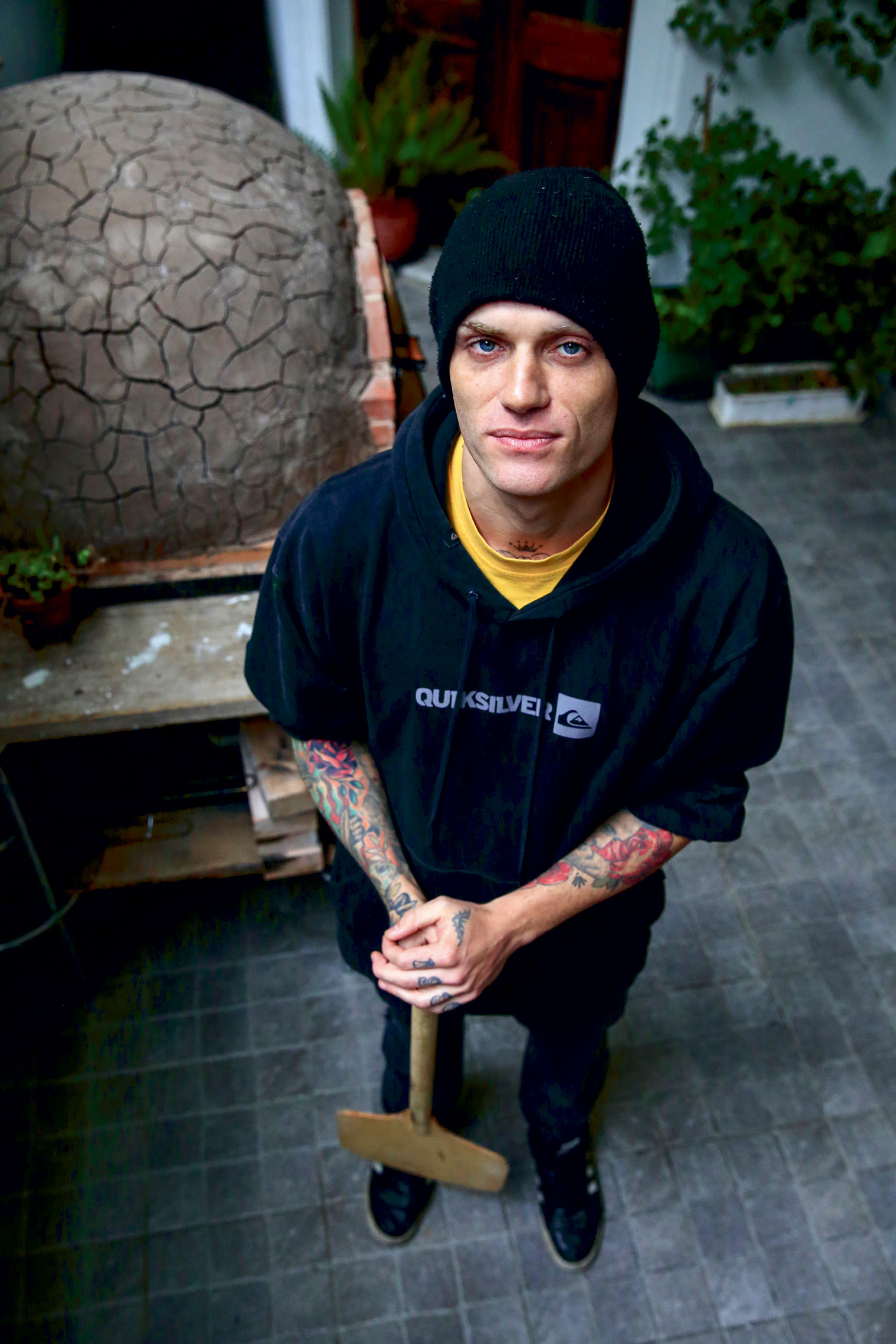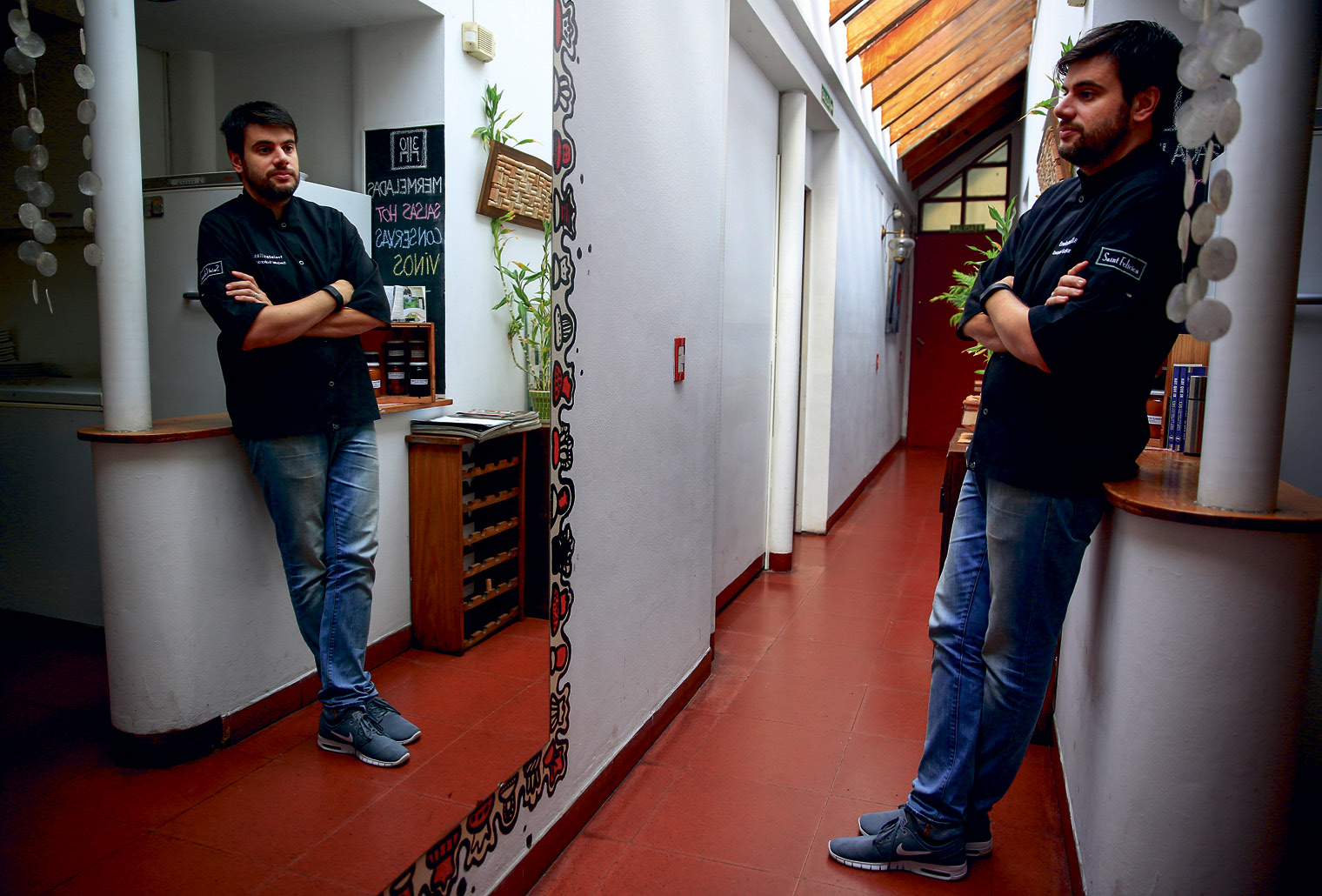It is Friday night in Buenos Aires, and dozens of diners are clustered around small tables. A singer croons jazz staples in the background, the music floating over a soft hum of conversation.
While chef Marcelo Antón prepares plates in a tight kitchen and his wife Romina greets new arrivals when the doorbell chimes, their young daughter dozes in an adjacent bedroom. The large 1930s house in the rustic Almagro neighbourhood looks just like any other, but every weekend Marcelo and Romina turn it into this homely restaurant.
“What we’re doing is totally illegal,” Marcelo says, slicing salami for an entrée. “As soon as I saw this house, I imagined it all – and a few months after renting the place, we opened up.”
His restaurant, Fuego Amigo – Fire Friend – is a recent addition to the eclectic gastronomic underworld of Buenos Aires. Known by locals simply as puertas cerradas – closed doors – these establishments have formed a unique culinary circuit which dates back to the crippling economic crisis that struck Argentina in 2001 and sapped capital from businesses across the board.
“Obviously, it’s much cheaper than getting a commercial space,” says Antón, a former model whose forearms are criss-crossed with gnarly tattoos. “It’s not like we have a gigantic operation here, so we manage our illegality and don’t bother anyone.”

Fuego Amigo chef and former model Marcelo Antón
In many ways, today’s Argentina echoes the turbulence of the early 2000s. The country has again sunk towards recession, after 12 years of populist policies were turned upside down by a pro-business government which took power in December 2015.
The bombastic left-wing president, Cristina Fernández de Kirchner, was replaced by conservative Mauricio Macri, who launched economic reforms designed to reopen markets and incentivise investment. He also settled a bitter stand-off with US hedge funds that had been holding out for higher returns since purchasing Argentina’s national debt during the catastrophic 2001 default.
US president Barack Obama visited in March - another symbolic step forward for the country’s reintegration into international markets. However, Macri’s radical policy shift has led to spiralling everyday costs for his citizens: Food, rent, petrol, electricity and public transport have all gone up in price, while subsidies have been removed and social spending slashed.
In July, thousands took to the streets of cities across Argentina, banging pots and pans to unleash a mighty din of protest at utility bills that have swelled by as much as 500 per cent. Inflation is up, employment is down, and the World Bank predicts the country’s GDP will shrink by 0.5 per cent this year.
Nowhere has felt the fiscal pinch more sharply than Buenos Aires. The puertas cerradas restaurants are just one segment of a shadowy informal economy which flourished during the Kirchner era, fuelled by unofficial exchange rates and a propensity to bend rules.

Entrance to Palermo establishment Ocho Once
Grey market boom
It is difficult to quantify how many of these establishments exist, but insiders believe the total is at least two dozen.
One of the first was Treinta Sillas – Thirty Chairs – which opened nearly ten years ago. Its head chef, Ezequiel Gallardo, favours a solidly Italian cookbook with Mediterranean overtones: dishes include burrata, bruschetta, saffron risotto and a zabaglione custard dessert.
As well as opening the restaurant at weekends, Gallardo teaches cookery classes at his colourful house with a red door in the genteel Colegiales neighbourhood. Its spacious patio is ideal for summer barbecues.
After serving as a senior chef at several brand-name eateries in Argentina and beyond, he invested in the property with the idea of starting Treinta Sillas firmly in mind – and he strives to avoid the chaos and chronic wastage of large restaurants. Gallardo named the place in honour of what he believes is the ideal number of clients to serve, and prides himself on forging a “special connection” with regulars.
Chatting after a particularly quiet night in the kitchen, Gallardo admitted the “180-degree” political and economic change has badly dented his income. “Restaurants all over Buenos Aires are empty – but this is the only way to improve things, so I don’t complain about what the government is doing,” he says. “Even though I started a successful business, the last ten years were terrible, because I’m not only thinking about myself.”
Over in the trendy Palermo neighbourhood, the Ocho Once – Eight Eleven – restaurant has been faring a little better – thanks to a prime location and a constantly evolving menu that blends local tradition with elements from Europe, South America and Asia.
The head chef, Gonzalo Bazterrica, juggles his culinary duties with accounting, carpentry and even electrical wiring. He acquired the house in a state of mild disrepair and lived there while restoring it.
Cutting his teeth at top restaurants in France left Bazterrica with a perplexing impression that Argentina was “closed to the world” during the “exhausting” Kirchner years.
“People thought it was like Venezuela in terms of crime,” he says. “I’m not a politician or an economist, but I know that story is going to change and more tourists will start coming now.”
Bazterrica’s partner is Dieter Mayer, a Swiss artist who also owns a farm that sends food and wine to the restaurant from Mendoza in western Argentina – meaning they are less vulnerable to the whims of price inflation. The duo see Ocho Once as a stepping stone to future ventures and hope to eventually branch out by opening a regular restaurant.
That is exactly what globetrotting sommelier Santiago Mymicopulo has done. After several years of nomadic adventures across the Americas, he returned to Buenos Aires and began hosting communal dinners with his wife at their apartment – to such success that they sensed a business opportunity and dubbed the project “Casa Coupage”.
In January, Mymicopulo leased a luminescent corner storefront in Palermo – complete with a wine cellar for bespoke tasting sessions – and set aside a separate chamber for Casa Coupage inside the restaurant, La Bumón. Both have been doing well, and Mymicopulo seems unperturbed by the political paradigm shift.
“The fact this happened now is a coincidence; I had to expand my business, no matter what,” he says. “I don’t think the change has been good for Argentines yet, but it’s great for foreigners – like the hedge funds and multinational corporations that export from here.”

Ezequiel Gallardo from Treinta Sillas, one of the first puertas cerradas in the city
Politics lags behind
At a grand colonial house outside the Palermo bubble, Paco Fernández and Pablo Marzulli specialise in classic Argentine cuisine with a creative twist, adapting ancestral recipes for contemporary palettes. Seafood and grilled meat feature prominently, but it’s not always easy getting what they need.
“Our main problems do not depend on who’s in government,” Marzulli says with a shrug. “Sometimes we add new dishes to the menu, but we have to change it straight away because products disappear.”
Our idea isn’t really an underground restaurant; it’s more like inviting someone to your house
“The market lacks quality control,” Fernández adds. “Argentina does not have a high culinary standard in general, but hopefully people will get more interested in food if the economic situation improves.”
Their house has also been hit by frequent power cuts, a notorious liability across Buenos Aires, which forces them to close shop and lose several weeks of business every year.
Those ritualistic ups and downs do not worry Ivana Piñar, a sommelier and event organiser who has been hosting candlelit dinners at her apartment for eight years, under the name “Paladar” – a reference to the wave of private restaurants which emerged in Cuba as an alternative to state-run tourist eateries.
“We’ve had plenty of slow months, but people keep coming because we offer personal service and create new menus all the time,” she said. “Our idea isn’t really an underground restaurant; it’s more like inviting someone to your house.”
Despite the sector’s evident growth in recent years, government regulation seems not to have caught up. In his previous job as mayor of the capital, current president Macri earned a reputation for inspecting independent cultural venues with a heavy hand – and even though a conservative ally now occupies that office, none of the closed-door restaurateurs were overly concerned about potential red tape.
“If they ever get around to regulating us, we’ll fix the papers and that’s it,” said Marcelo Antón, who casually admits that his landlord knows nothing about the existence of Fuego Amigo on the property.
No matter what happens with the notoriously shaky economy of a country where political scandal is never far away, Antón remains confident that his compatriots would always be able to take solace from the ready availability of great food and fine wine.
“We can’t look backwards,” he says. “The only thing we have is hope, because there are no surprises in Argentina.”
